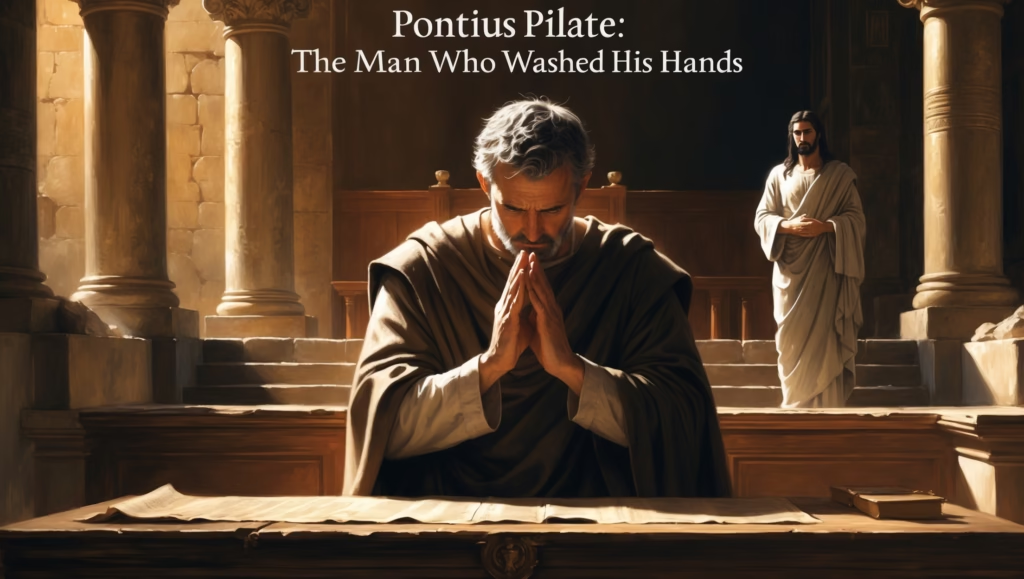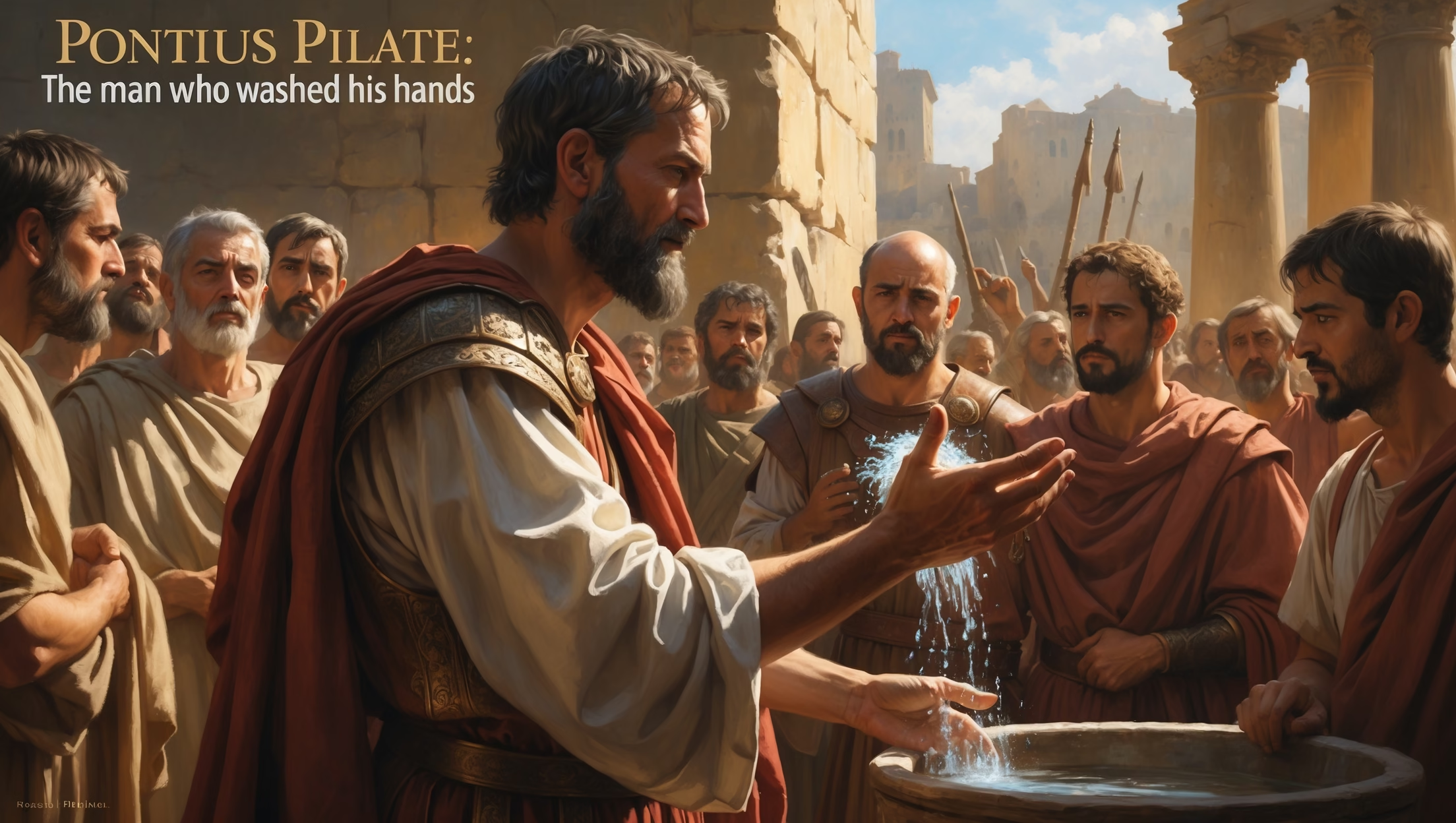History’s Most Infamous Bureaucrat
Pontius Pilate, the Roman prefect of Judea during the early first century, occupies a singular place in history. Known primarily from the New Testament as the man who presided over Jesus’ trial and “washed his hands” of the verdict, Pilate is remembered as both a symbol of political cowardice and a cautionary tale of bureaucratic complicity. Yet historical and archaeological evidence paints a far more complex portrait of the man behind the infamy.

Beyond the Gospel Account
The Pilate Stone: Concrete Evidence of Authority
In 1961, archaeologists uncovered an inscribed limestone block in Caesarea Maritima, known today as the Pilate Stone. The inscription confirms Pilate’s official title as “Prefect of Judea” under Emperor Tiberius. This discovery is significant: it anchors the Gospel narratives in verifiable history, affirming that Pilate existed not just as a literary figure but as a tangible administrator of Roman authority. The stone also reminds us that he was a man of Rome first—responsible for maintaining order, collecting taxes, and enforcing imperial law.
Philo’s Portrait: Venality and Violence
The Jewish philosopher Philo of Alexandria, writing during Pilate’s tenure, offers a scathing critique. Philo portrays Pilate as a prefect willing to exploit and oppress the local population for personal gain. He notes incidents of “venality, violence, and executions” that suggest Pilate was not merely passive but actively leveraged brutality to secure Roman rule. For example, he reportedly used funds from the Temple treasury to build an aqueduct—a move that provoked riots and required forceful suppression.
Through Philo’s eyes, Pilate emerges as a man acutely aware of the tension between Roman expectations and Jewish religious sensitivities. His frequent missteps reflect not moral weakness alone, but the impossible demands placed on provincial rulers tasked with governing a restive population under the watchful eye of an empire.
The Gospel Depiction: Political Theater and Moral Ambiguity
The canonical Gospels—particularly Matthew, Mark, Luke, and John—present Pilate in a morally ambivalent light. On one hand, he recognizes Jesus’ innocence: “I find no basis for a charge against him” (John 18:38). On the other, he ultimately capitulates to public pressure, authorizing crucifixion to prevent unrest.
Matthew’s account dramatizes the act of washing his hands, a gesture symbolizing Pilate’s attempt to distance himself from responsibility: “I am innocent of this man’s blood; see to it yourselves” (Matthew 27:24). Whether historical or symbolic, this moment has become emblematic of bureaucratic evasion—a man caught between conscience and political expediency.
Political Tightrope: Balancing Rome and Judea
Pilate’s actions cannot be fully understood without appreciating the delicate political environment of Judea under Roman occupation. He was responsible for:
- Maintaining Order: A restive population prone to revolt made the slightest misstep potentially catastrophic.
- Collecting Taxes: Heavy taxation fueled resentment, often inflaming anti-Roman sentiment.
- Enforcing Roman Law: Crucifixion was a tool reserved for rebels, yet public outcry could sway the application of justice.
In this context, Pilate’s decision to authorize Jesus’ execution reflects the harsh calculus of a governor prioritizing stability over morality—a classic example of realpolitik.
Later Legends: From Canonization to Dante
Over the centuries, Pilate’s image evolved in unexpected ways.
- Ethiopian Orthodox Tradition: Surprisingly, some early Christian traditions venerated Pilate as a saint, emphasizing repentance and the fulfillment of God’s plan.
- Dante’s Inferno: In stark contrast, Dante placed Pilate in the vestibule of Hell, eternally punished for indecision and cowardice.
These divergent portrayals underscore how Pilate’s legacy has been shaped by theological, cultural, and literary lenses rather than historical fact alone. He became more than a man; he became a symbol of moral compromise under pressure.
Modern Parallel: The “Just Following Orders” Defense
Pilate’s infamous handwashing resonates across history as a metaphor for bureaucratic abdication of responsibility. In the 20th century, military tribunals and war crimes trials frequently encountered the same ethical dilemma Pilate faced: obedience to authority versus moral judgment.
From Nazi officials at Nuremberg to contemporary debates over corporate and governmental complicity, Pilate’s story serves as a cautionary tale: the consequences of deferring ethical responsibility to expediency can be catastrophic.
Historical Complexity: More Than a Villain
It is tempting to reduce Pilate to a one-dimensional figure of cowardice. Yet archaeological and textual evidence reveals a man navigating a deeply unstable province under an empire that tolerated no failure. Pilate’s mixture of cruelty, administrative acumen, and political calculation suggests a figure shaped as much by circumstances as by character.
- As Bureaucrat: He managed taxation, legal disputes, and public order.
- As Politician: He balanced appeasing Jewish authorities with demonstrating loyalty to Rome.
- As Human: He faced moral tension, uncertainty, and the very public consequences of his choices.
This complexity invites reflection not just on historical events, but on ethical leadership, moral courage, and the cost of complicity.
Conclusion: Pilate’s Enduring Relevance
Pontius Pilate remains infamous not because he executed Jesus—many officials wield life-and-death authority—but because he sought to evade responsibility. His story invites us to examine how power, fear, and political expediency influence moral decisions.
The man who washed his hands has become the archetype of bureaucratic detachment, a figure repeated across centuries whenever individuals or institutions choose stability over justice. Pilate challenges readers, historians, and ethicists alike: in the face of injustice, will we act with integrity, or will we, too, simply wash our hands?








